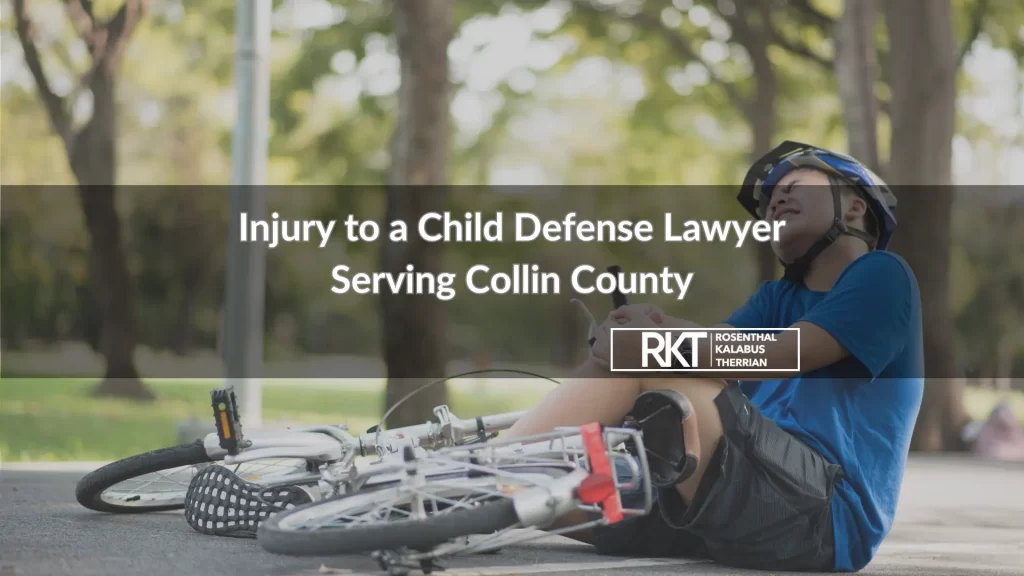
People are naturally protective of children, and no one wants to see a child in danger or harmed. As a result of this protective nature, however, child abuse is frequently reported even when there was no injury. The media and the community are often quick to rush to judgment on allegations of this nature, and law enforcement and prosecutors will aggressively pursue charges against those accused of these types of crimes. That’s why it is vital to hire an experienced criminal attorney to defend your rights, your freedom, and your reputation. Every individual is entitled to a presumption of innocence, and the Collin County injury to a child defense lawyers of Rosenthal Kalabus & Therrian will stand up for you to make sure that you get your day in court to defend yourself.
The crime of injury to a child under Texas Penal Code § 22.04 involves an alleged offender intentionally, knowingly, recklessly, or with criminal negligence causing bodily injury, serious bodily injury, or serious mental deficiency, impairment, or injury to a child. As mentioned above, prosecutors in Texas will often aggressively seek convictions carrying very steep punishments for accusations of injury to a child. Convictions can also lead to very devastating court decisions regarding custody that can significantly limit the amount of time an alleged offender gets to spend with their child.
Were you arrested for an alleged injury to a child anywhere in the Collin County area? Do not underestimate the seriousness of the criminal charges you are facing, and make sure that you discuss your defense with an attorney with experience handling these types of cases. Remember that you don’t have to say anything to authorities about the allegations against you, and instead, politely ask to call Rosenthal Kalabus & Therrian to represent you.
Rosenthal Kalabus & Therrian will work to protect your rights and help you clear your name. We will sit down with you and listen to your side of the story and will develop a strategy for your defense. Call us at (972) 369-0577 or reach out to us online to schedule a confidential consultation with one of our Collin County defense attorneys today.
Do I Need A Lawyer to Represent Me?
While you may know the truth about what happened or you may believe that the charges you face are incorrect or unfair, you will face a challenging task in defending yourself against the prosecutor’s presentation of the facts in court. You are entitled to a presumption of innocence, but the prosecutor will work to establish that your actions make you guilty of the crime you’ve been charged with.
Having an attorney represent and defend you is a fundamental right guaranteed to every U.S. citizen. Be sure to take advantage of this right and hire the best attorney you can to represent you. This means choosing a lawyer with the right experience handling these types of criminal cases, and one who understands your particular situation and how to build a convincing argument on your behalf.
When you hire an attorney, they will immediately conduct an independent investigation of the alleged incident. The lawyer will be able to compile their own collection of evidence while also reviewing all of the evidence that the prosecutor has. An experienced attorney is going to be able to identify all of the weaknesses in a prosecutor’s case and know how to attack them in court.
Your lawyer will do all they can to make sure that you get the best possible outcome for your case, which often means working on getting the charges against you reduced or dropped.
Why Choose Rosenthal Kalabus & Therrian To Handle My Case?

Rosenthal Kalabus & Therrian is the largest criminal defense firm in Collin County. Because of our size, clients enjoy the benefit of multiple attorneys collaborating together on their case.
Founding Partner Jeremy Rosenthal is Board Certified in Criminal Law by the Texas Board of Legal Specialization. Roughly 1 percent of attorneys are Board Certified.
Mr. Rosenthal is a former Assistant District Attorney in Collin County and the former Chief Prosecutor for County Court at Law Two. He has almost two decades of legal experience and is a Board Member of the Texas Criminal Defense Lawyers Association. He is also a member of the National College of DUI Defense and the National Association of Criminal Defense Lawyers.
What are the Consequences of an Injury to a Child Conviction?
Criminal charges for injury to a child depend on multiple factors, including the nature of the injury caused and the alleged offender’s culpable mental state. Injury to a child is a state jail felony punishable by up to two years in state jail and/or a fine of up to $10,000 when an alleged offender recklessly causes bodily injury to a child or negligently causes bodily or mental injury to a child.
Injury to a child is a third-degree felony punishable by up to 10 years in prison and/or a fine of up to $10,000 when an alleged offender intentionally or knowingly causes bodily injury to a child. Injury to a child is a second-degree felony punishable by up to 20 years in prison and/or a fine of up to $10,000 when an alleged offender recklessly causes serious bodily injury to a child or serious mental injury, deficiency, impairment or to a child.
Injury to a child is a first-degree felony punishable by up to 99 years or life in prison and/or a fine of up to $10,000 when an alleged offender intentionally or knowingly causes serious bodily injury to a child or serious mental injury, deficiency, or impairment to a child.
Frequently Asked Questions about Child Abuse Defense
Who is required to report child abuse in Texas?
Texas Family Code § 261.101 establishes that any person who suspects child abuse or neglect must report it immediately. A report can be made to a local or state law enforcement agency or the Department of Family and Protective Services (DFPS). Professionals who are licensed or certified by the state, or who work for an agency or facility licensed or certified by the state, and have contact with children as a result of their normal duties must report abuse or neglect within 48 hours. Failure to report suspected child abuse or neglect is a class A misdemeanor punishable by up to one year in jail and/or a fine of up to $4,000.
What is the difference between committing an offense intentionally, knowingly, recklessly, and with criminal negligence?
Texas Penal Code § 6.03 defines culpable mental states as follows. Under Texas Penal Code § 6.03(a), a person acts intentionally when it is their conscious objective or desire to engage in the conduct or cause the result. Texas Penal Code § 6.03(b) establishes that a person acts knowingly when they are aware of the nature of their conduct or that the circumstances exist and are aware that their conduct is reasonably certain to cause the result. Under Texas Penal Code § 6.03(c), a person acts recklessly when they are aware of but consciously disregard a substantial and unjustifiable risk that the circumstances exist or the result will occur. Texas Penal Code § 6.03(d) states that a person acts with criminal negligence when they should be aware of a substantial and unjustifiable risk that the circumstances exist or the result will occur.
Does spanking constitute child abuse?
Texas Family Code § 261.410 defines physical abuse as a physical injury resulting in substantial harm to a child requiring emergency medical treatment but excludes reasonable discipline by a parent, guardian, or managing or possessory conservator that does not expose the child to a substantial risk of harm.
Under Texas Family Code § 151.001(e), the only people allowed to use corporal punishment for the reasonable discipline of a child are a parent or grandparent of the child, a stepparent of the child who has the duty of control and reasonable discipline of the child, and an individual who is a guardian of the child and who has the duty of control and reasonable discipline of the child.
Texas Penal Code § 9.61 further provides that the use of force, but not deadly force, against a child younger than 18 years is justified when a person is the child’s parent, stepparent, or is acting in loco parentis (in the place of a parent) to the child, and when and to the degree the person reasonably believes the force is necessary to discipline the child or to safeguard or promote their welfare. Spanking is generally safe, but spanking that causes injury could result in criminal charges in some cases.
What is a safety plan?
A safety plan is an agreement that a child protective services (CPS) caseworker develops with a family to establish the safety services that will be used to manage threats to a child’s safety. It also refers to a voluntary agreement between a child-placing agency (CPA) and Residential Child Care Licensing (RCCL) staff that ensures a child in DFPS conservatorship is safe while an RCCL investigation is underway. A safety plan is not the same as a case plan. A safety plan is intended to manage safety threats right away, whereas a case plan invokes changes over time. A safety plan stays in effect as long as threats to a child’s safety exist. Safety Plans usually list specific items for the home and FAD worker to complete.
Is child abuse the same as child abandonment and child endangerment?
No. Abandoning or endangering children is a separate criminal charge under Texas Penal Code § 22.041. Abandoning or endangering children is a state jail felony when an alleged offender leaves a child with intent to return for the child, or intentionally, knowingly, recklessly, or with criminal negligence engages in conduct that places a child younger than 15 years of age in imminent danger of death, bodily injury, or physical or mental impairment. Abandoning or endangering children is a third-degree felony when an alleged offender abandons a child without intent to return for the child. Abandoning or endangering children is a second-degree felony when an alleged offender abandons a child under circumstances that a reasonable person would believe would place the child in imminent danger of death, bodily injury, or physical or mental impairment.
Contact a Collin County Injury to a Child Attorney Today
If you were arrested for an alleged injury to a child offense in the greater Collin County area, you should not try to explain your actions to authorities until you have legal representation. Let Rosenthal Kalabus & Therrian deal with the police and ensure that you do not say anything that could be used against you in court. Our firm will do everything in our power to protect you and resolve your case with the fewest possible penalties. Call (972) 369-0577 or contact us online to set up a free consultation.